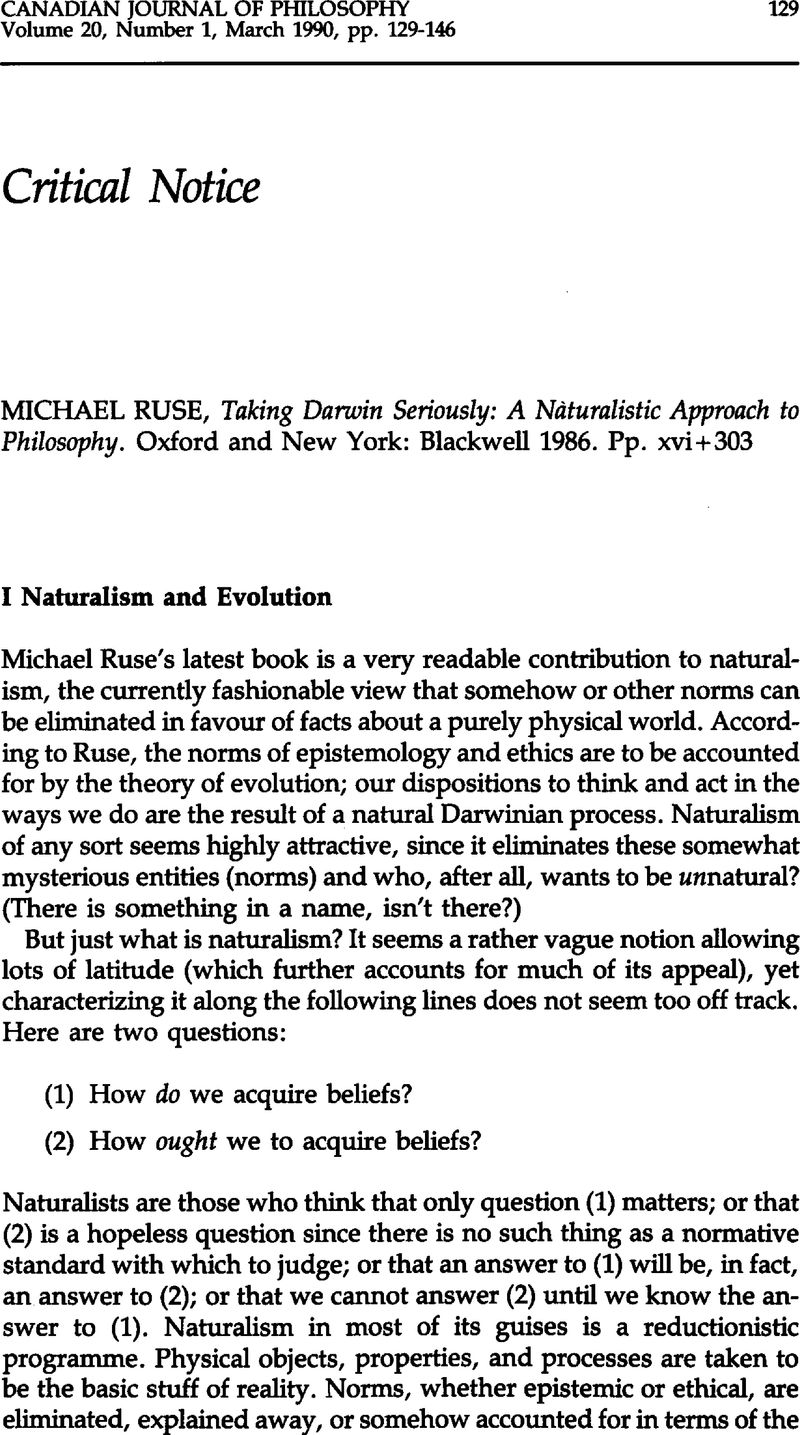No CrossRef data available.
Published online by Cambridge University Press: 01 January 2020

1 Toulmin, Human Understanding (Princeton: Princeton University Press 1972)Google Scholar
2 An excellent recent critique is B. Baigrie, ‘Natural Selection vs. Trial and Error Elimination,’ International Studies in the Philosophy of Science (1988).
3 It is actually hard to say whether the Reagans have suffered more by being associated with astrology, or astrology by having the Reagans take it seriously. It would be nice to see them go down the drain together, but we should not be sanguine about the prospects of this happening.
4 Rescher, Nicholas Methodological Pragmatism (Oxford: Blackwell 1977)Google Scholar
5 For detailed criticisms see Brown, James Robert ‘Rescher's Evolutionary Epistemology,’ Philosophia 15 (1985) 287–300CrossRefGoogle Scholar.
6 Quine, ‘Epistemology Naturalized’ in Ontological Relativity and Other Essays (New York: Columbia University Press 1969) 126CrossRefGoogle Scholar
7 Hume, Treatise on Human Nature (Oxford: Clarendon Press)Google Scholar
8 Hume, Treatise on Human Nature, 483-4Google Scholar. Hume's naturalism is every bit as important as his skepticism; indeed, they are linked. See Stroud, B. Hume (London: Routledge and Kegan Paul 1977)Google Scholar.
9 Kahneman, D. et al., eds., Judgment Under Uncertainty: Heuristics and Biases (Cambridge: Cambridge University Press 1982)CrossRefGoogle Scholar
10 Kuhn, T.S. The Structure of Scientific Revolutions (Chicago: University of Chicago Press 1970)Google Scholar; Laudan, L. Science and Values (Berkeley: University of California Press 1984)Google Scholar; Newton-Smith, W. The Rationality of Science (London: Routledge and Kegan Paul 1981)CrossRefGoogle Scholar
11 Some discussion of these issues can be found in Brown, ‘Rescher's Evolutionary Epistemology.'
12 See Kuhn, T. The Structure of Scientific Revolutions (Chicago: University of Chicago Press 1970)Google Scholar and Churchland, P. Scientific Realism and the Plasticity of Mind (Cambridge: Cambridge University Press 1979)CrossRefGoogle Scholar for examples of this outlook.
13 Boyd, ‘Scientific Realism and Naturalistic Epistemology,’ in P. Asquith and R. Giere, eds., PSA 1980, vol. II, 1981; Laudan, Science and Values
14 This is the same sort of objection some evolutionary biologists, e.g., Gould and Lewontin, raise against sociobiology.
15 For example, in ‘Philosophy and the Scientific Image of Man,’ in Science, Perception, and Reality (London: Routledge and Kegan Paul 1963).
16 Lorenz, ‘Kant's Doctrine of the A Priori in the Light of Contemporary Biology,’ reprinted in Plotkin, H. ed., Learning, Development, and Culture: Essays in Evolutionary Epistemology (New York: Wiley 1982), 128Google Scholar
17 Some of the themes of this essay were presented at a session on evolutionary epistemology at the Canadian Philosophical Association, Windsor, May 1988. I thank the audience and especially my fellow symposiasts: Brian Baigrie, Rich Campbell, and Paul Thompson, and also thank the book editor, John Baker, and a referee for CJP. Matti Sintonen has just sent me a recent article of his: ‘Sociobiology Helps - But Not Enough’ (Science Studies, Dec. 1988) in which he very nicely uses different senses of simplicity to undermine the views of Ruse and others in a way which strongly reinforces the scientific image/manifest image distinction.